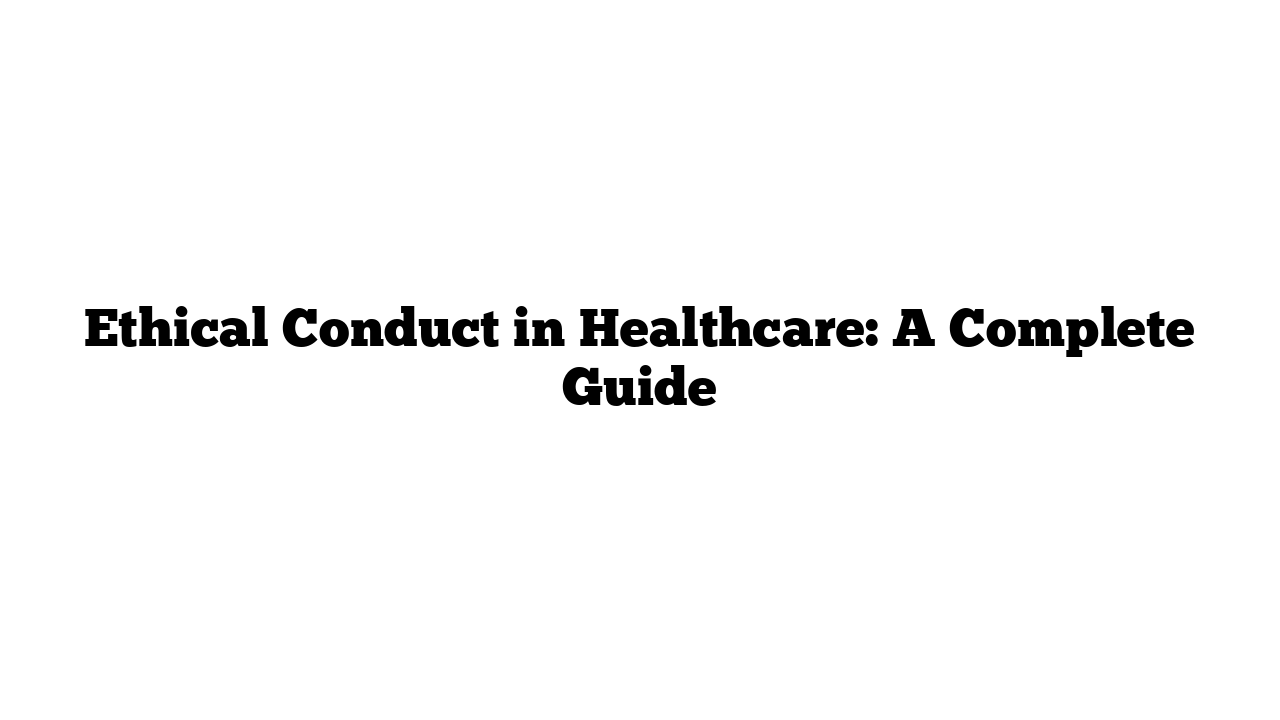Ethical conduct in healthcare is a cornerstone of trust between patients and medical professionals. It guides decision-making, improves patient outcomes, and ensures fairness in medical practices. Understanding the key principles of ethical conduct is vital for everyone in the healthcare system, whether you are a patient, provider, or policymaker.
Below, we’ll explore the core principles of medical ethics, examples of real-world applications, and how ethical guidelines shape healthcare practices in the United States.
What Is Ethical Conduct in Healthcare?
Ethical conduct refers to adhering to a set of moral principles and professional standards in healthcare. It ensures that patients receive fair, compassionate, and unbiased treatment. Healthcare ethics combine principles like respect, autonomy, beneficence, non-maleficence, and justice.
These principles form the foundation for maintaining integrity and building trust in the medical field.
Key Principles of Ethical Conduct
1. Autonomy
Patients have the right to make decisions about their own healthcare. This includes understanding their medical condition, being informed about treatment options, and providing consent.
Example: A patient diagnosed with cancer has the right to choose or refuse chemotherapy after being informed about the risks and benefits.
2. Beneficence
Healthcare providers must act in the best interest of their patients, aiming to promote health and prevent harm.
Example: Recommending a preventive screening to catch potential illnesses early demonstrates beneficence.
3. Non-Maleficence
“Do no harm” is a core principle in medical ethics. This means avoiding actions that could harm a patient, even unintentionally.
Example: Ensuring that surgical procedures are necessary and conducted safely reduces the risk of harm.
4. Justice
Fairness in healthcare is essential. Patients should have equal access to medical services, regardless of socioeconomic status, race, or gender.
Example: Implementing free vaccinations in underserved communities ensures justice in healthcare access.
Real-Life Examples of Ethical Dilemmas in Healthcare
Even with clear principles, ethical dilemmas often arise. Here are a few common scenarios:
1. End-of-Life Decisions
Patients and families may face decisions about life support. While respecting autonomy is key, doctors must also consider beneficence and non-maleficence.
Example: A patient’s advance directive specifies not wanting life support, but their family requests otherwise.
2. Resource Allocation
Limited resources, like ICU beds or organs for transplantation, can create ethical challenges. Healthcare providers must balance justice with the needs of individual patients.
Example: During the COVID-19 pandemic, prioritizing ICU beds for critically ill patients highlighted the need for ethical decision-making.
3. Confidentiality
Respecting patient privacy is a critical ethical obligation. However, breaches may occur when public safety is at risk.
Example: Reporting communicable diseases like tuberculosis is necessary for public health but challenges patient confidentiality.
Laws and Policies Supporting Ethical Conduct in the USA
1. The Health Insurance Portability and Accountability Act (HIPAA)
HIPAA protects patients’ health information and ensures confidentiality.
2. The Patient Self-Determination Act (PSDA)
This law empowers patients to make advance directives about their healthcare.
3. Professional Codes of Conduct
Organizations like the American Medical Association (AMA) provide ethical guidelines for healthcare professionals.
The Role of Training in Ethical Conduct
Training programs in medical schools and hospitals emphasize the importance of ethics in healthcare.
Example: Physicians are trained to communicate effectively with patients, ensuring informed consent and shared decision-making.
Promoting Ethical Awareness in Healthcare Teams
Creating a culture of ethics involves ongoing education, transparent communication, and accountability. Hospitals often establish ethics committees to address challenging situations and offer guidance.
How Patients Can Advocate for Ethical Care
- Ask Questions: Understanding your rights and options helps you make informed decisions.
- Request Transparency: Insist on clear communication from healthcare providers.
- Report Concerns: If you notice unethical behavior, report it to hospital administrators or medical boards.
For more resources and tips, visit medicaltimes.io.
FAQs – Top 10 Questions About Ethical Conduct in Healthcare
- What is ethical conduct in healthcare?
Ethical conduct means following moral and professional guidelines to ensure fair and compassionate medical care. - What are the 4 principles of medical ethics?
The principles are autonomy, beneficence, non-maleficence, and justice. - Why is patient confidentiality important?
It builds trust and protects patients’ privacy, which is vital for effective care. - What is informed consent?
It is the process of ensuring patients understand and agree to a treatment plan. - How do doctors handle ethical dilemmas?
They follow ethical guidelines, consult ethics committees, and balance competing principles. - What is an ethics committee?
It’s a group in healthcare institutions that addresses complex ethical issues and provides guidance. - How do laws support ethical healthcare?
Laws like HIPAA and PSDA ensure patient rights and confidentiality. - Can patients refuse treatment?
Yes, patients have the right to refuse treatment as part of their autonomy. - What role do ethics play in end-of-life care?
Ethics guide decisions on life support, palliative care, and respecting patient wishes. - How can I advocate for ethical care?
Ask questions, request transparency, and report unethical practices.
